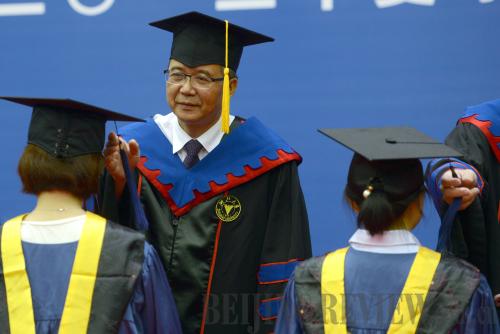|
 |
|
ANOTHER BRICK IN THE WALL: President Lin Jianhua attends Zhejiang University's 2013 graduation ceremony on June 29 (HAN CHUANHAO) |
On June 26, Lin Jianhua was appointed by national education authorities to take the helm of prestigious Zhejiang University in east China's Zhejiang Province. But the transfer brought the obscure former headmaster of Chongqing University nothing but embarrassment.
Just days before the announcement, Zhejiang University's alumni jointly posted a statement online expressing their requirements for a new president, as well as an open letter directly opposing the rumored installation of Lin on the grounds.
"A university with a history of 116 years needs a president who has an excellent academic background in order to carry on its distinguished cultural legacy," the open letter wrote.
It said that Lin, who was provost and executive vice president of Peking University before becoming president of Chongqing University in October 2010, was a solid administrator yet did not have impressive academic achievements.
Founded in 1897, Zhejiang University ranked 28th on the 2013 Asian University Rankings released by British higher education consulting company Quacquarelli Symonds in June. It is the sixth most prestigious among all higher learning institutions on the Chinese mainland. The university has more than 44,000 full-time students.
Wang Xiaojie, head of the French chapter of Zhejiang University's Alumni Association who contributed to the formation of the online statement, said that the students, teachers and alumni of the university should be able to have a say in who is appointed its president.
In his inauguration speech, Lin said that he will work hard to provide professors and students with the opportunity to realize their potential and compete fairly.
Stifling bureaucracy
In China, the presidency of a top-notch university is deemed as an official government post. Currently, presidents of 76 universities directly under the Ministry of Education (MOE) have administrative rankings corresponding to vice minister or bureau chief.
That administrators of the nation's top universities are officials first and educators second is a frequent criticism.
"They answer to the higher authorities that appoint them but not the faculty and students," said Xiong Bingqi, Deputy Director of Beijing-based education think tank 21st Century Education Research Institute, noting that bureaucracy in higher learning institutions across the country has hampered teaching quality.
"How its president is elected reflects the key values of a university, which should be the pursuit of higher academic levels, rather than bureaucratic abilities," said Yang Dongping, Director of the institute.
The appointment system shows that Chinese universities are not independent, Yang said, adding that the system needs reform and autonomy of universities is an important component of education reform.
According to Liu Daoyu, former President of Wuhan University in central China's Hubei Province, the current method for selecting university presidents seems to have taken a big step backwards compared to the system that was in use in the 1980s when the MOE would carry out opinion polls among senior academics before appointment. Now university headmasters are simply brought in from on high.
Wang explained, "Professors and students have no idea today who will be appointed head of the university tomorrow; if this were to happen in France it would be a joke."
Wang favors an approach in which the position is first advertised publicly and then a competitive screening of candidates is undertaken by a body formed by the university in collaboration with central authorities. He suggested that alumni should also be invited to take part in the process.
Chu Zhaohui, a researcher with the National Institute of Education Sciences, warned that "parachuted" presidents were very likely to fail due to a lack of knowledge about their schools.
| 